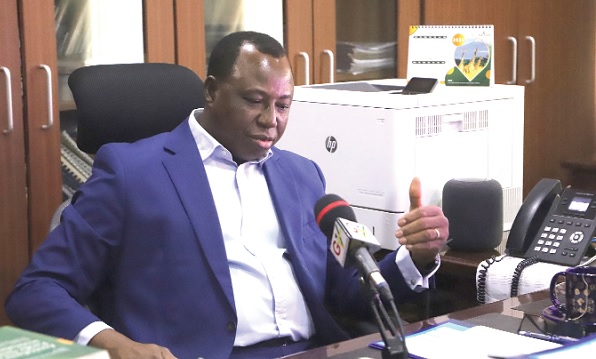
Anti-corruption plan cure for IMF bailout — CHRAJ
The Commission on Human Rights and Administrative Justice (CHRAJ) has stated that the National Anti-Corruption Action Plan (NACAP) will save the country from the cycle of returning to the International Monetary Fund (IMF) for economic support.
The Commissioner of CHRAJ, Joseph Whittal, in an interview with the Daily Graphic last Thursday, said NACAP, which was the country’s strategic response to corruption, needed the full attention of the government as a major anti-corruption tool to settle on.
He said the plan, if fully implemented, would include a robust Conduct of Public Officers Act, which would tackle rampant conflict of interest situations with sanctions and ensure a robust assets declaration regime among officers in public service, from the President to the messenger.
Mr Whittal expressed worry that in spite of the overriding importance of NACAP in checking corruption emanating from the public sector, there had been little interest in passing the Code of Conduct Bill, adding that “the bill is presently before Cabinet”.
Context
The interview was to seek the commission’s views on the proposal by the IMF Staff Level Agreement to review NACAP as one of the prerequisites for the government to fight corruption.
When the government submitted a programme to the IMF for support, CHRAJ was one of the institutions requested by the Ministry of Finance to inform it of some key governance issues, corruption, human rights and others that needed the attention of the IMF team.
Ultimately, as part of the commitments the country made to access the IMF support, the NACAP strategy, adopted in 2014, with implementation starting from 2015 to 2024, will continue to be implemented and updated during the programme period.
The government committed to take stock of the strength and weaknesses of the current anti-corruption framework and work with internal and external stakeholders to strengthen it.
More attention
Commenting on the IMF’s interest in the antigraft strategy, Mr Whittal told the Daily Graphic that much attention needed to be given to NACAP in the fight against corruption, ensuring that resources were spent well and to reduce dependence on international financing agencies.
“Considering the way the country ends up with unbridled expenditure, there is the need to ensure governance guard rails around governmental action,” Mr Whittal stated.
He indicated that NACAP was needed to promote national integrity and empower the public to report corruption and related misconduct more confidently.
Mr Whittal said he was greatly pleased to hear the IMF team agreed with the government to make the Conduct of Public Officers bill a major law that needed to be passed as an anti-corruption law for years to come.
The CHRAJ Commissioner said although the commission had made far-reaching interventions in the fight against corruption such as mobilising both public and private sector stakeholders to develop NACAP as the country’s anti-corruption blueprint, the country needed to be committed to the antigraft plan.
Review
Mr Whittal said NACAP was set to be reviewed and evaluated into at least a five-year strategic plan when it expired in 2025.
The review will consider prevailing issues, collate inputs, assess achievements and identify gaps to fine-tune it into a more fit for purpose strategy of the time.
The 10-year plan coordinated and spearheaded by CHRAJ since 2015 will expire next year.
The plan, which is in line with the third mandate of CHRAJ, aims to combat corruption through prevention, investigation and enforcement as well as public education through its adoption by Parliament as the blueprint for fighting corruption in Ghana.
Mr Whittal said the commission would continue to monitor and evaluate the 10-year plan and submit progress reports on its implementation before it expired.
He underscored the importance of the plan in the commission’s aim at working with stakeholders to improve the country's performance on the corruption index.
Background
Ghana’s strategy against corruption was conceived at the first National Integrity Conference organised by CHRAJ in 1998.
The national anti-corruption strategy was validated at the second integrity conference in October 2011.
Since its inception in 2015, progress reports on the country’s performance have been issued in 2015, 2016, 2017, 2018 and 2019.
The strategy also involves all Ghanaians in the fight with a premium on public awareness of corruption to reduce corruption tolerance levels as it is not in the interest of the political elite.
It also aims to assist public offices to strengthen internal mechanisms for preventing and reducing opportunities for corruption and to develop internal Codes of Conduct for their staff in compliance with the Conduct of Public Officers law.
